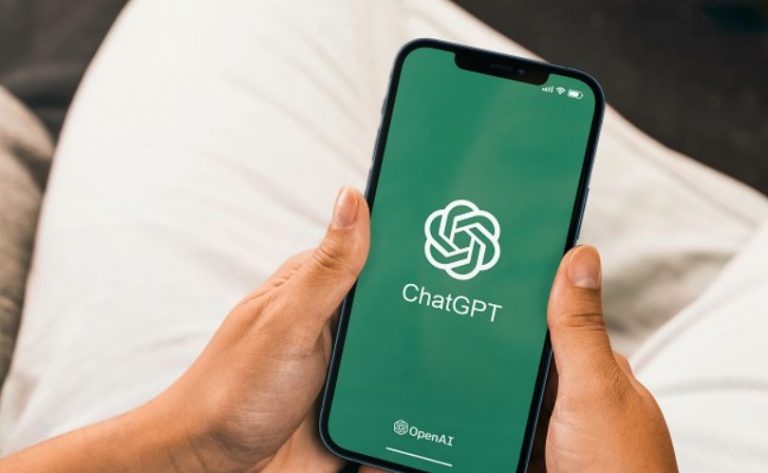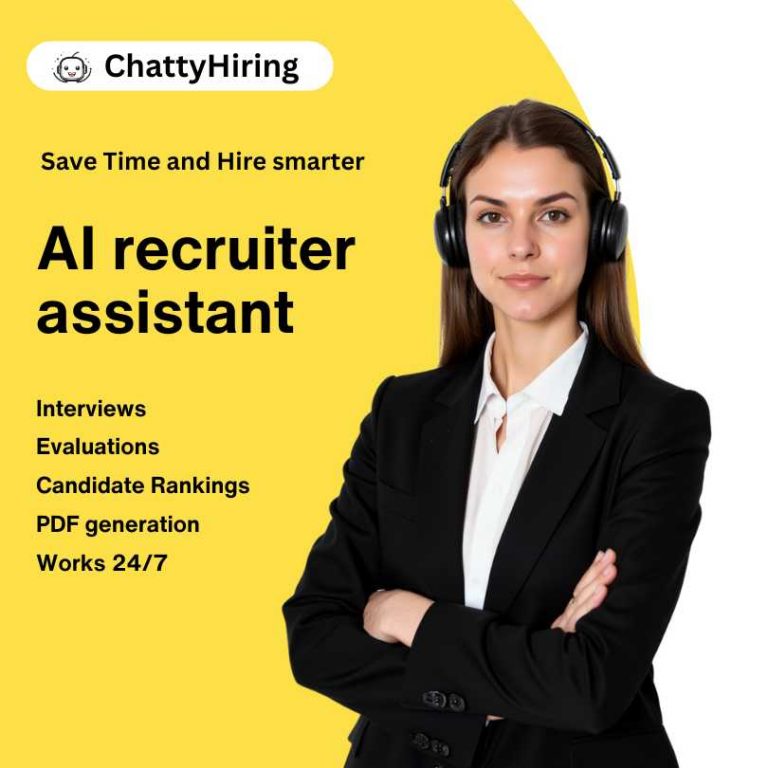In 2024 a new revolution started: ChatGPT. Integrating advanced technologies like ChatGPT into hiring processes offers numerous advantages. However, it’s essential to balance these benefits with an understanding of the challenges associated with using ChatGPT in isolation, as opposed to specialized AI recruitment tools.
Key Takeaways
- ChatGPT is a dynamic and innovative solution that is revolutionizing talent acquisition processes.
- Natural language processing, machine learning, are key to start qualifying best candidates in just hours autonomously
- Implementing chatbot solutions, conducting research, and collaborating with cross-functional teams is the future of recruitment.
- Although useful for certain things, ChatGPT is not a recruitment designed tool. It may have many drawbacks.
- Specialized recruitment tools based on Generative AI technology might be the right solution to overcome the main inconveniences to use the Public solutions like Chatgpt.
Advantages of Using ChatGPT in recruitment
-
Enhanced Efficiency: ChatGPT can process vast amounts of data swiftly, enabling quicker resume reviews and candidate assessments. This acceleration reduces time-to-hire, a critical factor in today’s competitive talent market. By automating initial candidate interactions, recruiters can focus on more strategic tasks, thereby optimizing the recruitment process.
-
Automated Candidate Engagement: By employing ChatGPT-powered chatbots, recruiters can automate initial interactions, answer frequently asked questions, and schedule interviews, ensuring timely and consistent communication with candidates. This level of engagement enhances the candidate experience, leading to higher satisfaction and a positive perception of the employer brand.
-
Consistent Communication: ChatGPT ensures uniform messaging across all candidate interactions, minimizing the risk of human error or bias in communications. Consistent communication helps in building trust with candidates and ensures that all applicants receive the same information, promoting fairness in the recruitment process.
-
Scalability: During peak recruitment periods, ChatGPT can manage a high volume of candidate interactions without delays, maintaining a smooth and efficient process. This scalability ensures that no candidate is overlooked and that the recruitment process remains efficient, regardless of the volume of applicants.
Challenges of Using ChatGPT without specialized tools
While ChatGPT offers significant benefits, relying solely on it without specialized recruitment tools presents challenges:
-
Lack of Recruitment-Specific Features: ChatGPT is a general-purpose language model and may lack functionalities tailored for recruitment, such as advanced applicant tracking, candidate sourcing analytics, and compliance management. Without these features, recruiters might find it challenging to manage the end-to-end recruitment process effectively.
-
Integration Difficulties: Integrating ChatGPT into existing recruitment workflows can be complex without a dedicated interface, potentially leading to inefficiencies. Seamless integration is crucial to ensure that data flows smoothly between systems and that recruiters can access all necessary information without switching platforms.
-
Risk of Bias: Without proper oversight, AI models like ChatGPT can inadvertently perpetuate biases present in their training data, leading to unfair hiring practices. It’s essential to implement measures to detect and mitigate bias to ensure a fair recruitment process.
-
Data Privacy and GDPR Compliance: A significant concern when using ChatGPT is ensuring compliance with data privacy regulations like GDPR. ChatGPT processes and stores data, which may include personal information of candidates. Without proper controls, there’s a risk of unauthorized access or data breaches, leading to potential legal implications. Employers must exercise caution in how they collect, store, and utilize candidate data to ensure compliance with privacy regulations such as GDPR or CCPA. It’s crucial to be transparent about how data is used and obtain consent from candidates, which helps build trust with future employees.
The Role of Specialized AI Recruitment Tools
To overcome these challenges, many organizations are turning to specialized AI recruitment platforms that offer tailored solutions:
-
Comprehensive Functionality: These platforms provide end-to-end recruitment solutions, including candidate sourcing, resume screening, interview scheduling, and analytics, all designed to enhance the hiring process. By consolidating these functionalities, recruiters can manage the entire recruitment lifecycle more efficiently.
-
User-Friendly Interfaces: Designed specifically for talent acquisition teams, these tools offer intuitive interfaces that streamline workflows and improve user experience. A well-designed interface ensures that recruiters can navigate the system effortlessly, reducing the learning curve and increasing productivity.
-
Enhanced Compliance and Bias Mitigation: Specialized tools often include features to ensure compliance with hiring regulations and implement measures to detect and reduce bias, promoting fair hiring practices. For instance, some platforms provide transparency in AI decision-making processes, allowing recruiters to understand how decisions are made and ensuring they align with regulatory requirements.
-
Data Privacy and GDPR Compliance: Specialized AI recruitment tools are designed with data privacy in mind, ensuring that candidate information is handled in compliance with GDPR and other data protection regulations. These platforms often provide features such as data anonymization, secure storage, and explicit consent mechanisms, ensuring that candidate data is protected and used responsibly. For example, some tools offer functionalities to manage candidate consent and provide transparency in data processing activities, which are essential components of GDPR compliance.

Implementing ChatGPT in Recruitment: Best Practices
For organizations considering the integration of ChatGPT into their recruitment processes, it’s essential to follow best practices to maximize benefits and mitigate risks:
-
Conduct a Data Protection Impact Assessment (DPIA): Before implementing ChatGPT, conduct a DPIA to identify and mitigate potential data protection risks. This assessment helps in understanding how ChatGPT processes data and ensures that appropriate measures are in place to protect candidate information.
-
Ensure Transparency: Inform candidates about the use of AI in the recruitment process and how their data will be processed. Providing clear and concise privacy notices builds trust and ensures compliance with GDPR’s transparency requirements.
-
Obtain Explicit Consent: Before processing personal data, obtain explicit consent from candidates. This consent should be documented, and candidates should have the option to withdraw their consent at any time.
-
Implement Data Minimization: Collect only the data necessary for the recruitment process. Avoid excessive data collection to reduce the risk of data breaches and ensure compliance with data protection principles.
-
Regularly Review and Update Policies: Continuously monitor and update data protection policies to align with evolving regulations and best practices. Regular audits can help identify potential vulnerabilities and ensure ongoing compliance.
If you’re interested in ChatGPT Recruiting, you may also want to check out this article on 7 AI Generative Tools to Assist HR Professionals. This article explores various AI tools that can help HR professionals streamline their processes and improve efficiency. Additionally, you may find this article on New Interview Competency-Based Questions Generator helpful in creating effective interview questions tailored to specific job roles. Lastly, don’t miss out on The Secret of AI Interviews for HR, which delves into the benefits and challenges of using AI in the interview process.
FAQs
What are the benefits of using ChatGPT for Recruiting?
Some benefits of using ChatGPT Recruiting include saving time for recruiters by automating repetitive tasks, providing a consistent and efficient candidate experience, and reducing bias in the recruiting process.
Is ChatGPT Recruiting suitable for all types of businesses?
Using ChatGPT for Recruiting can be a good solution by a wide range of businesses, mainly small freelancers. However, its effectiveness may vary depending on the specific needs and requirements of each process
Are there any limitations to using ChatGPT Recruiting?
While ChatGPT Recruiting can automate many aspects of the recruiting process, it may not be able to handle complex or highly specialized job positions that require in-depth technical knowledge or specific industry expertise. Additionally, it may not fully replace the need for human interaction in the recruiting process.
-

A passionate advocate for the future of HR innovation. With expertise in leveraging AI to revolutionize recruitment processes, Carlos has a clear vision: empower HR teams while creating meaningful candidate experiences.
View all posts



